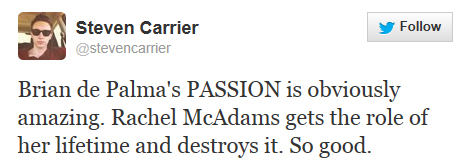
 Hello and welcome to the unofficial Brian De Palma website. Here is the latest news: |
|---|
E-mail
Geoffsongs@aol.com
-------------
Recent Headlines
a la Mod:
Listen to
Donaggio's full score
for Domino online
De Palma/Lehman
rapport at work
in Snakes
De Palma/Lehman
next novel is Terry
De Palma developing
Catch And Kill,
"a horror movie
based on real things
that have happened
in the news"
Supercut video
of De Palma's films
edited by Carl Rodrigue
Washington Post
review of Keesey book
-------------
Exclusive Passion
Interviews:
Brian De Palma
Karoline Herfurth
Leila Rozario
------------
------------
| « | August 2013 | » | ||||
| S | M | T | W | T | F | S |
| 1 | 2 | 3 | ||||
| 4 | 5 | 6 | 7 | 8 | 9 | 10 |
| 11 | 12 | 13 | 14 | 15 | 16 | 17 |
| 18 | 19 | 20 | 21 | 22 | 23 | 24 |
| 25 | 26 | 27 | 28 | 29 | 30 | 31 |
De Palma interviewed
in Paris 2002
De Palma discusses
The Black Dahlia 2006

Enthusiasms...
Alfred Hitchcock
The Master Of Suspense
Sergio Leone
and the Infield
Fly Rule
The Filmmaker Who
Came In From The Cold
Jim Emerson on
Greetings & Hi, Mom!
Scarface: Make Way
For The Bad Guy
Deborah Shelton
Official Web Site
Welcome to the
Offices of Death Records
 Back in early 2009, I posted links to a couple of reviews of Erik Van Looy's Loft, in which five married men share a penthouse loft where they indulge in their various affairs. The dead body of an unknown woman is discovered in the loft, and paranoia among the men ensues. Variety's Boyd Van Hoeij wrote that the film features "a nod to Brian De Palma in a standout sequence at a casino." FilmFreak's Alex De Rouck mentions that Van Looy and screenwriter Bart De Pauw emphatically wink to De Palma "in his Hitchcock period (especially in the long scenes in Dusseldorf and in the casino)."
Back in early 2009, I posted links to a couple of reviews of Erik Van Looy's Loft, in which five married men share a penthouse loft where they indulge in their various affairs. The dead body of an unknown woman is discovered in the loft, and paranoia among the men ensues. Variety's Boyd Van Hoeij wrote that the film features "a nod to Brian De Palma in a standout sequence at a casino." FilmFreak's Alex De Rouck mentions that Van Looy and screenwriter Bart De Pauw emphatically wink to De Palma "in his Hitchcock period (especially in the long scenes in Dusseldorf and in the casino)."
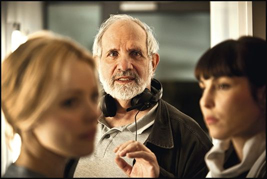 Sorry for the late notice on these, but last Friday, three new interviews with Brian De Palma popped up on the web. Here are some highlights (THERE MIGHT BE SOME SPOILERS!):
Sorry for the late notice on these, but last Friday, three new interviews with Brian De Palma popped up on the web. Here are some highlights (THERE MIGHT BE SOME SPOILERS!):I don’t really think about that. It’s a lot of problem solving. You take from the original film, which you like, and when you say, “Well I can’t reveal the murderer’s identity when this character is killed, unlike the original film. So, I’m not gonna show that. Well, where is she? In the original film, she’s in the movie theater. In this, I put her in the ballet because that’s something that I always wanted to put in a film. I wanted to juxtapose the ballet with the murder, but that’ll evolve. And I was fortunate enough to find a very talented ballerina who had done the ballet in Germany and we were able to get the rights to reproduce it in our movie. All these things sort of make the movie and I could use this split screen idea to make the audience think that Noomi is at the ballet by using that trick and ultimately revealing that she’s not at the ballet, but she’s really under the scaffolding by Christine’s house.
I love when you use split screens. It’s one of my favorite things you do in your films. The way you use it to tell a story is fascinating. Have you always liked using that, especially in a film like this?
Well, it’s a technique, one that’s very effective. I tried to use it in Carrie to show the destruction of the prom, but something that I realized is that it’s not good for action. Split screen is not good for action and I consequently used very little of it. When we looked at it, I said, “This is not working.” So, I removed a lot of split screen from that sequence, but it’s kind of a meditative form. A kind of form to show a lot of juxtaposition and it’s a slow form. It’s a form that you have to allow to really sink in and it worked quite well in this movie. Using the ballet as this sensuous act between these two dancers and, kind of like a magic trick, you’re looking at one side of the screen when something really sinister is going on on the other side. When you can catch an audience off guard a little bit, that’s quite good.
...
I like the fact that in your work you still focus on the slow burn and it seems like a lot of filmmakers today don’t do that. They want to keep the action going. Do you ever feel like you need to move on and just do a film with quick cuts and all that?
No, I think that’d be a big mistake. After seeing these big action films, it feels like an endless drumming. After a while, everyone says, “Please, stop! I can’t take this anymore!” The sequences are too long, they’re not carefully thought out and with all choreography and in all action sequences you have to have a slow build up in order to go fast. You need to be quiet in order to be loud. That’s sort of a basic thing in all art forms, whether it be music or film.
[This interview also has a lot of De Palma quoting Rachel's lines from the film and laughing about them, etc.]
De Palma: Are you really a film school reject?
I actually couldn’t afford to go to film school.
I am a film school reject! I took a two semester course at NYU. The teacher and Martin Scorsese were so unhappy with my movie. The problem was I shot it in three days, but it was supposed to be done in eight weeks. He took my whole unit off my movie and put them on another movie, leaving me alone in the editing room. They never liked me at NYU. Well, I am a film school reject, so I can identify with your site [Laughs].
Why didn’t they like you at NYU?
You know, if you haven’t been to film school, you shoot 100 feet of film, people talk about it, you shoot another 100 feet of film, and everyone talks about it. I shot all my film on a weekend. I wasn’t interested in what they had to say about my 100 feet of film. That was the end of my film school experience. Later on I taught, so I went to the other side of it.
Would you recommend film school?
Yeah. When I was in graduate school I had a very good theater teacher where I learned a lot. I’d absolutely recommend it.
...
When do you know what the visual language of a film is going to be? When writing the script for Passion, do you know exactly how the camera should move and the aesthetic you want?
Well, at the beginning of the movie, you’re basically dealing with girls talking to girls across a desk, so you have to find an interesting location to put all that. I found a fantastic office building in Berlin. When you get into what Isabelle is dreaming and what actually happened and what didn’t, then you get a chance to really pull out all the stops and make it very visually evocative. Of course, I love to do stuff like that.
Over the past few years, from The Black Dahlia to Mission to Mars, you’ve taken on notable challenges. At this point, is it still easy to find challenges?
Every film has its challenges. As long as you have ideas and ways to solve them that are interesting to your particular aesthetic, it’s great fun to do. This film had a great opportunity because it’s all women, and I love shooting women.
Even the German girl who played Dani was another fabulous actress. She had a very difficult part because she was acting for her first time in English and she had all that complicated exposition. I mean, with “Dani the explainer” in that kitchen scene, her job is to make that interesting. That was quite a feat she managed.
She has a such a distinct look as well.
Yeah, she was in Perfume as well. I’m a friend of Tom Tykwer’s. When I saw that red hair in Perfume, I thought, “That’s what we want!” I wanted red, but not that red [Laughs]. I love that film.
Same here. There are a few filmmakers from your generation that have kind of lost their touch. What’s the trick in maintaing that initial spark?
You mean, how have I not become a fossil?
Exactly.
Thanks. How do I answer that? Well, with fame and success, people tend to insulate themselves. I tend to still be very much the film student, basically. I’m the only director that goes to film festivals just to see movies. I’ve been saying this for 30 or 40 years, but nobody seems to have caught on. When I go to a film festival they ask, “What are you doing here? Do you have a movie coming out?” “Well, no.” “Then what are you doing here?” I say, “I’m here to look at the movies!”
I don’t have bodyguards or an entourage. I go to the movies like if you were at a film festival. Also, I hangout with a bunch of young directors. I miss the fraternity we had in the 1970s, because all my friends from then are in different parts of the country. I hang out with directors who live in my neighborhood. That keeps you lively. What can I say?
The Dissolve: One of the more compelling aspects of the movie is its office setting, which is this transparent space where people also have hidden agendas. What were you looking to get out of that design?
De Palma: That’s an extraordinary building in Berlin. The whole building was vacant because of the recession. So we were very fortunate to get in there. And it’s a beautifully designed home for these aggressive advertising executives. I scouted many buildings, and we were very fortunate to get that particular one, because the schedules changed, and sometimes the buildings weren’t available. A lot of things happen in movies by happenstance, and you adjust your material to that.
The Dissolve: When you were scouting buildings, this was the type of space you were looking for?
De Palma: An office is an office. There’s a table, and somebody’s on one side of the desk and somebody’s on the other. And there are a lot of scenes like that in the film, so the more interesting space that you could put them in, the happier I am.
...
The Dissolve: Your work is carefully orchestrated, but where does the planning stop? Are there areas of the production that you like to leave open?
De Palma: This is a relationship picture, and the girls came in to rehearse, and we sort of watched what they did and how they played with the material, and we adjusted the script to their interaction. But in terms of the long, silent sequences, the dream sequences… That’s pretty carefully laid out. I had a lot of time to basically storyboard the whole movie.
The Dissolve: Does it frustrate you as a filmgoer to see the language of a film employed less carefully than that? All that work is elided in a lot of movies.
De Palma: Yes, I would agree. I’m astounded by—whether you’re making a science-fiction movie, a zombie movie, a Star Trek, a Marvel Comics Spider-Man movie—these action sequences that seemingly go on endlessly, without any type of shape or form. So much in action has to do with choreography, and orienting the viewer in where everything is. And I’m amazed all the time that nobody seems to pay much attention to that. So you basically get action and reaction, and it’s like an endless drumming without any shape.
The Dissolve: It seems like they’re trying to make up in sheer, visceral force things that could be done much more elegantly.
De Palma: And obviously, in order to have a crescendo, you have to have some silence. It’s just so simple, but nobody seems to pay much attention to it. They’re basically banging at you constantly. And then in a movie, it’s two hours, too, and then everybody says, “My God, when is this going to be over?” [Laughs.]
The Dissolve: Passion includes a really big split-screen sequence. What was the planning like for that, and what effect were you were looking to achieve?
De Palma: I always wanted to use that ballet. I saw it on video on the Internet. It was shot in the ’50s somewhere with Jerome Robbins’ choreography of Afternoon Of A Faun. And it’s a fantastic idea: ballet dancers in a rehearsal room going through their motions, relating to the mirror, and then obviously culminating in the kiss at the end. And I’ve always wanted to use this piece. I just think it’s so beautiful, and so cinematic. So I had the opportunity to put it into this film. The original movie had Isabelle going to the movies and slipping out the side door, and I put her at the ballet. And I used that tight close-up to make the audience think she was always at the ballet while the murder was going on at the house.
[Regarding the score for Passion, De Palma said:]
I’d say the toughest thing we had to figure out was the scene where Noomi suffers that humiliation and walks down from her office to the garage. We had to figure out how to not make it too sentimental, and at the same time deal with the fact that she’s been demolished. So that was very tricky. We spent quite a lot of time trying to get the exact right cue.





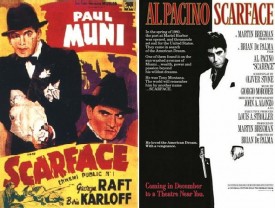 Deadline's Nikki Finke took time out of her vacation this past Wednesday to post a story about Universal's Scarface "reboot." "There’s a ton of curiosity and criticism about Universal‘s Scarface reboot since both the 1932 Chicago bootlegging film and 1983 Miami cocaine-dealing versions were so iconic," Finke states. "Understanding that, the studio according to my sources has been refining the script with several screenwriters and drafts while keeping all names and details under wraps."
Deadline's Nikki Finke took time out of her vacation this past Wednesday to post a story about Universal's Scarface "reboot." "There’s a ton of curiosity and criticism about Universal‘s Scarface reboot since both the 1932 Chicago bootlegging film and 1983 Miami cocaine-dealing versions were so iconic," Finke states. "Understanding that, the studio according to my sources has been refining the script with several screenwriters and drafts while keeping all names and details under wraps."
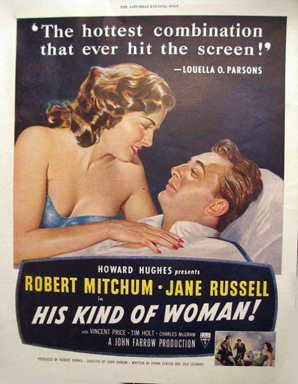 Mr. Beaks' new interview with Brian De Palma was posted today at Ain't It Cool News. They talk about Passion, De Palma's abandoned remake of John Huston's Treasure Of The Sierra Madre, current TV vs. film, and De Palma's meeting with Daft Punk, among other things.
Mr. Beaks' new interview with Brian De Palma was posted today at Ain't It Cool News. They talk about Passion, De Palma's abandoned remake of John Huston's Treasure Of The Sierra Madre, current TV vs. film, and De Palma's meeting with Daft Punk, among other things.De Palma: In your career, you really don't predict how these things happen. I was working on a lot of projects, and they were all tied up, and I couldn't get them launched in that five-year period. The Boston Stranglers was all tied up at Paramount, as was the prequel to The Untouchables. The problem with these movies is that these scripts get a lot of money against them. A guy wrote a script based on an old RKO movie that Mitchum did called [His Kind Of Woman], and I couldn't talk the RKO people into giving me the rights. So there's a lot of frustration with respect to development. So this movie sort of came to me because they wanted to make an American version, and I said, "Great! I can go to Paris and work on this!" That's how it happened.
De Palma: Well, if you have a very good idea… obviously, Treasure Of The Sierra Madre is a fantastic movie. To remake that is a little madness. But I had a very good idea: instead of gold, I was going to make it about cocaine. You get it up there in the mountain it's kind of dealing with dust, but when you get it on the streets of New York it's like solid gold. And not only do you get corrupted because of the money, you get corrupted because of the drug. That gave me a really good idea. I came up with that idea so many years ago it's hard to remember. But it's very difficult to remake a classic movie. We were very fortunate with Scarface. Howard Hawks's Scarface is really good.
Beaks: Whatever happened to your Treasure Of The Sierra Madre?
De Palma: I have no idea. I wrote it so long ago, I don't even remember what I even did with it.
Beaks: I found a copy of the screenplay.
De Palma: You're kidding! I didn't even know there was a copy of the screenplay.
Beaks: I'm always hunting for those scripts of yours that never got made, and a friend of mine tracked this one down.
De Palma: How is it?
Beaks: It's great! I love the twist you put on it. It starts out so much like the original film that I wasn't sure what you were up to, but then it begins to go its own way, and it's really terrific. If you could ever get that together, I'd love to see that movie.
De Palma: Man. I haven't thought that about that in thirty or so years. (Laughs)
Beaks then asks, "Did you design all of your shots ahead of time, or did you allow yourself leeway to invent stuff on the day?"
De Palma responds, "What's interesting about this one is that we had a long time to work on the script as we were preparing production and casting it, and I also had the advantage of the other movie. So I literally laid the whole movie out, every setup and every shot. I had these architectural programs where you could put people in them and move them around. And I could reference the other movie: two women talking to each other from across a desk. I could take a shot from the other movie and put it into my storyboards. 'Oh, that's the scene where Isabelle comes into Christine's office and they talk about A, B and C.' I printed them all out, so I could stack 8x11 printouts on my desk and walk anyone through the whole movie."
Beaks later asks De Palma if the power-struggle-kissing scene between Isabelle and Christine was scripted. De Palma replies, "Absolutely not. The girls did it on the day. When Noomi grabs her and gives her the kiss of death, and Rachel kisses her back leering at Noomi's assistant in the doorway... (Laughs) I would just sit behind the camera and smile. 'My god, these girls are really doing it!' They did a lot of stuff like that. The way she's playing with her in the car. 'I want to be admired! I want to be loved!' She kisses her, and Noomi's like, 'What the hell is going on here?' And Rachel picks up the lipstick and says, 'You need a little color.' (Laughs) It's hilarious!"
In discussing how eroticism in film has changed due to the more explicit nudity shown on cable TV, De Palma mentions the sex tape scene in Passion, saying, "That scene where the guy uses the camera to videotape their making out in the hotel room, I basically just gave them a camera and said, 'Just do whatever you would do.' (Laughs) Believe me, they did some incredible things."
'PHANTOM', DAFT PUNK, & PAUL WILLIAMS
Mr. Beaks also asks about the resurgence of interest in Phantom Of The Paradise, noting Daft Punk's recent collaboration with Paul Williams on the song "Touch". "It's great to be remembered!" De Palma tells Beaks. "I met with Daft Punk in Paris. We talked about Phantom, but it was just a preliminary discussion. I don't know what will come of it. We've always had a stage version we wanted to do, but it's never really come together. I saw the Paul Williams documentary, and thought it was charming."
Read the whole great interview here.
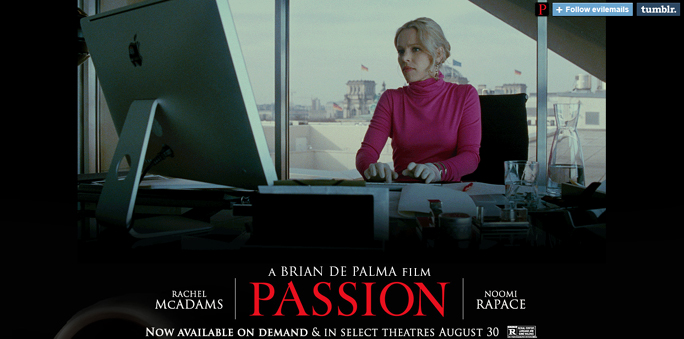
"In Passion, Christine (Rachel McAdams) is a powerful executive while Isabelle (Noomi Rapace) is her hard-working prodigy. In a dog eat dog world, competition is going to get fierce and coworkers are bound to get their toes stepped on if they aren't on top of their game. Things can get nasty real fast if something goes awry. E-vil Emails is the worst of the worst in the workplace: tales of lost tempers, backstabbing, humiliation, and more. While this kind of behavior is surely something to experience On Demand and in theatres, we've created a place where these stories can come to life. We're inviting you to submit your nastiest, most embarrassing, incriminating, and horrible work emails you've ever received or sent. Surely you have some drafts in your inbox consisting of things you wish you could really say to your boss. There must be a time where a coworker threw you under the bus and you just wish you could anonymously vent about it! Don't hesitate, send your e-vil emails our way to evilemails@passionthemovie.com."
(Thanks to Lindsey!)
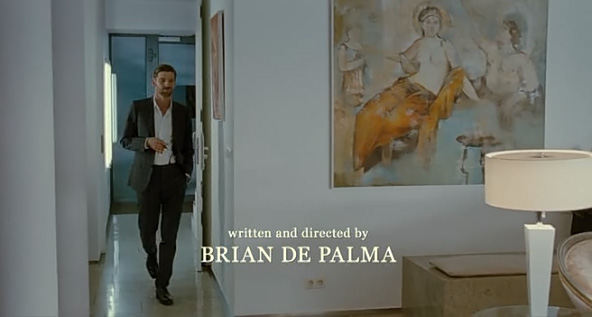
Meanwhile, in a brief review, Noel Murray at the Los Angeles Times states, "Costars Rachel McAdams and Noomi Rapace start out a little stiff in Passion, and the film as a whole is so flat in its first third that it almost seems as if De Palma is baiting the audience. But then the man who made Dressed to Kill and Body Double shows up, throwing in split screens, over-the-top music cues and an ending that's hysterically nonsensical. All in all, this is De Palma's most playful, enjoyable movie since Femme Fatale."
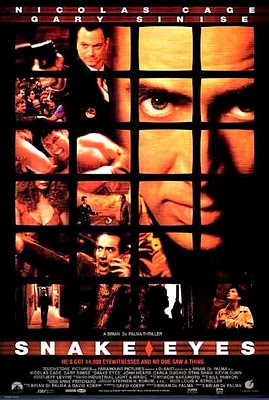 Drew Taylor's interview with Brian De Palma was posted today at The Playlist, and Taylor took the opportunity to ask De Palma about the lost ending of Snake Eyes. "The whole idea at the end of Snake Eyes was deus ex machina," De Palma told Taylor. "We were dealing with such a corrupt world that the only way to solve the problem is to have a hurricane come through and wipe it all away. That was my initial idea. And the problem is that people don't believe in that [laughing]. They don't believe in God looking down from above and saying, 'The only way to deal with this is a flood. There's so much corruption here, let's wipe it all away and get an ark out and start from scratch.' But it didn't work in the previews so we did this other ending which I don't think is as effective. We did shoot this big wave that swept through the casino but we ultimately cut it out."
Drew Taylor's interview with Brian De Palma was posted today at The Playlist, and Taylor took the opportunity to ask De Palma about the lost ending of Snake Eyes. "The whole idea at the end of Snake Eyes was deus ex machina," De Palma told Taylor. "We were dealing with such a corrupt world that the only way to solve the problem is to have a hurricane come through and wipe it all away. That was my initial idea. And the problem is that people don't believe in that [laughing]. They don't believe in God looking down from above and saying, 'The only way to deal with this is a flood. There's so much corruption here, let's wipe it all away and get an ark out and start from scratch.' But it didn't work in the previews so we did this other ending which I don't think is as effective. We did shoot this big wave that swept through the casino but we ultimately cut it out."For more about the original ending for Snake Eyes, see this De Palma a la Mod post from 2011.
'STAR WARS', 'HAPPY VALLEY', & AN UNTITLED PROJECT TO BE SET IN FRANCE
Taylor also asked about De Palma's role in the opening crawl for Star Wars. "Well, you know, I find about these things that even my memory is beginning to dim a little bit. What I do remember is there was a crawl and Jay Cocks and I looked at it and said to George, 'I think we can make this better, because there's so many complex things going on here. Why don't you give us a shot at re-writing this?' And we did."
Earlier in the interview, Taylor said to De Palma, "Passion is a remake of a fairly recent French movie. You've been linked to another Untouchables and a Paranormal Activity sequel in the past. How do you feel about sequels and remakes, both in terms of your own work and what you choose to do? And how close did Paranormal Activity and Untouchables get?"
De Palma replied: "Well that's like ancient history, those two projects. The Untouchables prequel has all sorts of economic and legal problems wrapped up with Paramount. And the Paranormal situation was that they reached out to me and we had some discussions about it but that was many, many years ago. Right now I'm working on the Joe Paterno/Sandusky situation [Happy Valley, which De Palma also told Taylor is "a very serious movie about the whole Paterno/Sandusky situation"] and something that's set in France. So that's what's going on now."
SHOCKYA INTV - DE PALMA ON JEROME ROBBINS BALLET, DONAGGIO, & VOD RELEASE
Shockya's Karen Benardello posted a separate interview with De Palma yesterday. Here is an excerpt featuring the last three questions:
BDP: Well, that’s a ballet I particularly like. I saw the Jerome Robbins choreography on the Internet, and it’s a black and white video that had to be taken in the ’50s. I thought it was a fantastic reimaging of this particular Debussy piece, ‘Afternoon of a Faun,’ and I’ve always wanted to put it in a movie. This gave me a perfect place to do it.
In the original film, she goes to the movies and slips out. **SPOILER ALERT** In this case, I wanted to put her in a ballet, so I could place the ballet against the murder at Christine’s house. By using that big close-up, you always think that Isabelle is at the ballet, and she couldn’t possibly be at the house. **END SPOILER ALERT**
SY: ‘Passion’ marks the seventh that you’ve worked on with music composer Pino Donaggio. Since the film is a crime mystery drama, what was the process of working with Pino to create the perfect score for the film, and capture the rivalry between Christine and Isabelle?
BDP: Well, I’ve worked with Pino on seven films together. He knows how to do these long violent sequences that I create. The last cue at the end of the film, when the last nightmare takes place, no one writes music like that but him. It’s exciting and suspenseful and scary and dramatic, and it’s completely unique to his talent.
SY: ‘Passion’ is set to be released on Thursday on VOD, with a theatrical rollout set to follow on August 30. What are your thoughts on VOD-do you think it’s the new release precedent for smaller, independent films?
BDP: Well, I’ve never done it this way before, and I’m interested to see how it plays. It was the choice of the distributor, and I’ve never had a movie released first On Demand, and then theatrically in a theater. But we’re looking at films all the time on smaller screens, so that’s the way it seems to be going.